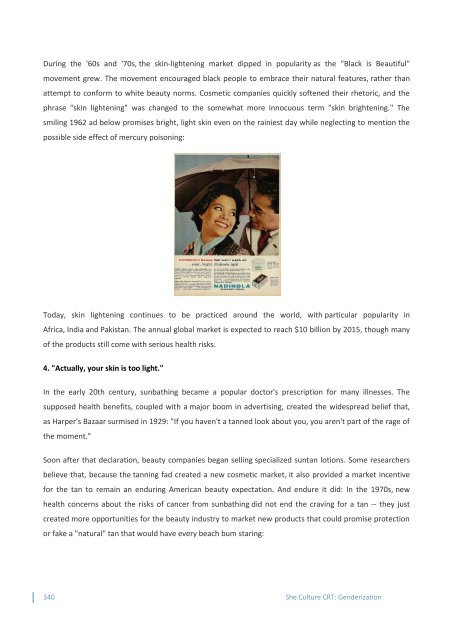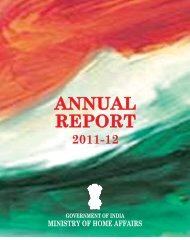7.Genderization
7.Genderization
7.Genderization
You also want an ePaper? Increase the reach of your titles
YUMPU automatically turns print PDFs into web optimized ePapers that Google loves.
During the '60s and '70s, the skin-lightening market dipped in popularity as the "Black is Beautiful"movement grew. The movement encouraged black people to embrace their natural features, rather thanattempt to conform to white beauty norms. Cosmetic companies quickly softened their rhetoric, and thephrase "skin lightening" was changed to the somewhat more innocuous term "skin brightening." Thesmiling 1962 ad below promises bright, light skin even on the rainiest day while neglecting to mention thepossible side effect of mercury poisoning:Today, skin lightening continues to be practiced around the world, with particular popularity inAfrica, India and Pakistan. The annual global market is expected to reach $10 billion by 2015, though manyof the products still come with serious health risks.4. "Actually, your skin is too light."In the early 20th century, sunbathing became a popular doctor's prescription for many illnesses. Thesupposed health benefits, coupled with a major boom in advertising, created the widespread belief that,as Harper's Bazaar surmised in 1929: "If you haven't a tanned look about you, you aren't part of the rage ofthe moment."Soon after that declaration, beauty companies began selling specialized suntan lotions. Some researchersbelieve that, because the tanning fad created a new cosmetic market, it also provided a market incentivefor the tan to remain an enduring American beauty expectation. And endure it did: In the 1970s, newhealth concerns about the risks of cancer from sunbathing did not end the craving for a tan -- they justcreated more opportunities for the beauty industry to market new products that could promise protectionor fake a "natural" tan that would have every beach bum staring:340 She Culture CRT: Genderization



